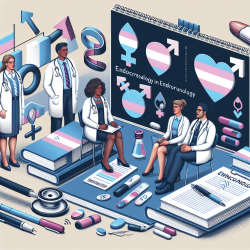In recent years, the healthcare sector has increasingly recognized the unique needs of transgender individuals. Despite this growing awareness, many medical professionals still feel unprepared to provide comprehensive care to transgender patients. A recent study titled "Transgender health objectives of training for adult Endocrinology and Metabolism programs: Outcomes of a modified-Delphi study" offers a promising solution by establishing standardized training objectives for endocrinologists.
The Need for Specialized Training
Transgender individuals face significant barriers when accessing healthcare, often resulting in unmet medical needs. These barriers are exacerbated by a lack of standardized education on transgender health within medical training programs. This gap is particularly evident in endocrinology, where specialists play a crucial role in managing hormonal care for transgender patients.
The study highlights that many endocrinology fellows report inadequate training in transgender care, with some receiving less than two hours of content annually. This inadequacy contributes to clinicians feeling uncomfortable or unwilling to provide necessary care. Addressing this gap is essential for improving healthcare outcomes for transgender individuals.
Implementing Consensus-Built Objectives
The study employed a modified-Delphi process to develop Transgender Health Objectives of Training (THOOT) for inclusion in Canadian Endocrinology and Metabolism Residency programs. This method involved a diverse panel of experts, including program directors, physician content experts, residents, and transgender community members.
- Round 1: Panelists reviewed 81 literature-extracted THOOT and provided feedback. Based on their input, the list was refined to 55 objectives.
- Round 2: The refined objectives were further assessed, resulting in consensus on eight key THOOT. Post-Delphi feedback led to consolidating these into four core objectives for curriculum inclusion.
This consensus-driven approach ensures that the resulting objectives are comprehensive and reflect the collective expertise of stakeholders. By integrating these objectives into residency programs, practitioners can be better equipped to address the specific healthcare needs of transgender patients.
A Blueprint for Future Innovations
This study not only provides a framework for enhancing transgender health education but also sets a precedent for future curricular innovations. The use of Kern’s six-step model of curricular design offers a structured approach to integrating these objectives into existing programs.
As the medical community prepares for Competency-Based Medical Education (CBME) in 2025, these objectives offer a scaffold for developing evaluation processes that ensure ongoing improvement and relevance. Furthermore, this initiative aligns with broader efforts to promote equity, diversity, and inclusion within medical education.
Encouraging Further Research and Development
The success of this study underscores the importance of continued research and collaboration across disciplines. Future efforts could explore advanced areas of focused competency or specialized fellowship programs in transgender medicine. Engaging stakeholders from various fields such as primary care, psychiatry, and surgery will be crucial in developing a more comprehensive approach to transgender health.
Despite potential barriers such as limited curricular time and faculty competency, the transition to CBME and revisions to competency frameworks provide an opportunity to advocate for these changes. By embracing these objectives, the medical community can take significant strides toward achieving health equity and social justice for transgender individuals.
To read the original research paper, please follow this link: Transgender health objectives of training for adult Endocrinology and Metabolism programs: Outcomes of a modified-Delphi study.










